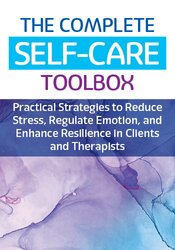
Get immediate lifetime access to this content by purchasing the digital seminar/online course instead that you can access using a variety of devices, and one CE certificate is included with purchase! Click the “Digital Seminar” or "Online Course" link below to learn more!
DVD Purchasers please note: In order to view the content, you will be required to have a DVD player or a DVD drive on your computer. Your CE is a separate fee.

Self-care isn’t just a trendy buzzword—it’s a game-changer for improving treatment for anxiety, ADHD, addictions, trauma, and other clinical challenges.
And it goes far beyond quick fixes like spa days or vacations.
Real self-care involves practical, science-backed strategies that tackle deeprooted issues and respect intersecting identities for lasting impact.
And let’s not forget how crucial self-care is for you as a clinician.
When you take care of yourself, you’re not just preventing burnout—you’re also enhancing your effectiveness, strengthening client relationships, and bringing your best self to every session.
Watch Dr. Robyn L. Gobin, acclaimed self-care researcher, author, and psychologist, as she transforms self-care from a cliché into a powerful tool for improving client outcomes.
In this training, you’ll gain:
With real-life case examples, worksheets, and templates, this training is your all-in-one guide to mastering self-care—for your clients and yourself.
Purchase now!
Continuing education credit information is coming soon for this non-interactive self-study package.
CE hours may be available for select professions, as listed in the target audience. Hours will be dependent on the actual recording time. Please check with your state licensing board or organization for specific requirements.
There may be an additional fee for CE certificates. Please contact our Customer Service at 1-800-844-8260 for more details.
**Materials that are included in this course may include interventions and modalities that are beyond the authorized practice of your profession. As a licensed professional, you are responsible for reviewing the scope of practice, including activities that are defined in law as beyond the boundaries of practice in accordance with and in compliance with your professions standards.

Robyn L. Gobin, PhD, is a licensed clinical psychologist renowned for her work in self-care, mindfulness, and trauma-informed care. As the author of The Self-Care Prescription: Powerful Solutions to Manage Stress, Reduce Anxiety & Increase Well-Being, Dr. Gobin brings a wealth of knowledge and practical solutions to her clinical and research endeavors.
In her role as an associate professor and director of the Transforming Trauma and Mental Health Research Laboratory in the Department of Kinesiology and Community Health, Dr. Gobin focused on advancing evidence-based treatments for posttraumatic stress disorder (PTSD) and other trauma-related conditions. Her research explores the impact of individual, cultural, and societal factors on trauma outcomes, aiming to enhance healing in culturally diverse communities, reduce mental health stigma, and boost treatment engagement.
Dr. Gobin’s interest in mindfulness, acceptance and compassion-based interventions is reflected in her extensive work and public outreach. She has served as a principal or co-investigator on studies funded by the International Society for the Study of Trauma and Dissociation, The American Psychological Association Minority Fellowship Program, and the Chez Center for Veterans. Her research has been widely published, and she regularly presents her findings at national and international conferences.
Dedicated to public education and community service, Dr. Gobin frequently speaks at community events, hosts workshops on mental health and self-care, and holds leadership roles on national boards and non-profit committees. Her contributions to the field have been recognized with prestigious awards, including a Citizen Psychologist Presidential Citation from the American Psychological Association, the Carolyn Payton Early Career Award from the Society for the Psychology of Black Women, and Early Career Awards from Wesleyan College and the National Register of Health Service Psychologists.
Dr. Gobin’s commitment to self-care and mental health is central to her practice and outreach, embodying her mission to empower individuals and communities through evidence-based strategies and compassionate care.
Speaker Disclosures:
Access never expires for this product.
Visit our FAQ page at www.pesi.com/faq or contact us at www.pesi.com/info
Understand Self-Care: Definitions, Evolution, Frameworks, and Essential Competencies
Self-Care, Mental Health, and Clinical Effectiveness
Cultural Self-care
Specialized Clinical Toolkits
Monitor Progress and Adapt Strategies
Clinician Ethics Around Self-care
Clinician Self-Care: Build Your Self-Care Blueprint
Satisfaction Guarantee
Your satisfaction is our goal and our guarantee. Concerns should be addressed to: PO Box 1000, Eau Claire, WI 54702-1000 or call 1-800-844-8260.
ADA Needs
We would be happy to accommodate your ADA needs; please call our Customer Service Department for more information at 1-800-844-8260.
PESI Mobile App
Access CE trainings on your phone or tablet through our free mobile app. Choose video or audio-only versions of online courses from the world’s best instructors, and complete your CE requirements anywhere, anytime, at your own pace.
Please wait ...